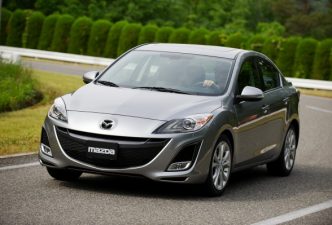 I was in Grade 4, in Canada, and learning about all the secrets and marvels of life. There was the discovery of books like 1984, new information about sex and how our parents’ genes combine to make us who we are; we were taught how to make our own movies, and program computers – and one other thing stuck in my mind: It was when Mr. Birch taught us about the automobile industry.
I was in Grade 4, in Canada, and learning about all the secrets and marvels of life. There was the discovery of books like 1984, new information about sex and how our parents’ genes combine to make us who we are; we were taught how to make our own movies, and program computers – and one other thing stuck in my mind: It was when Mr. Birch taught us about the automobile industry.
“Why don’t cars last forever,” he asked? “It’s not like the materials aren’t there to prevent them from rusting, or the technology for the motor from wearing out,” he explained.
The real reason, the big secret was… Yes? I was on the edge of my seat, waiting for a special answer… “The real reason,” he said, “is that automobile manufacturers don’t want to make their cars last forever. It isn’t in their interests. A car that last forever isn’t good for business.”
Chasing A New Car
Fast-forward about 12 years and I am working my way through university on a car production line. It was Chrysler. I noticed a strange phenomenon – working class people, who hated their mundane jobs, were the first to line up and buy new cars. They would follow the car they’d bought, as it passed along the production line, making sure it would turn out perfectly.
All that overtime, all that soul-sucking time injecting glue into a door panel, or punching plugs into the floor of a car was spent on a new car! Was I the only one who could see the ludicrousness of it all?
Now what does this have to do with the environment? It’s my opinion that there are a number of ways to make your life less impacting on the planet, and scrapping the car is one of them.
No Progress
A recent study in the Syndney Morning Herald by transport researcher Paul Mees found that despite the so-called advances in fuel-efficiency of the modern car, fuel efficiency of the auto hasn’t really changed since 1963.
Mees says: “the current rate of progress in making cars more fuel efficient is no progress at all.” Based on his estimates, in 1963 the average Australian car could travel about 100km on about 11 liters of petrol. The same find of efficiency, on average is found in cars today.”
Why has there been no progress? Compiling data from the Australian Bureau of Statistics, Mees found that the car engine has improved in efficiency, but any positives in efficiency have been lost by all the enhancements found in today’s cars – power steering and windows, air con, and pimped out entertainment systems.
Also an international review by Australian researchers Peter Newman and Jeff Kenworthy found that people who live in the cities with the fastest traffic use the most petrol and spend more time in their cars. The research that the overall emissions per person are lower in the cities with slower traffic versus those in cities with fast traffic. So if you think building more freeways will make your cars more efficient, and cut down the pollution in your city, maybe it’s time to think again.
Mees’ advice to slow down the impact of auto pollution on the environment is to tell drivers to drive slower: “If you drive at 110kmh you use more fuel than if you drive at 70kmh.”
Hybrid Cars
A hybrid vehicle is one that uses two or more different power sources to propel the vehicle forward. Most common is the hybrid electric vehicle (the HEV) internal combustion engine/electric motor combination, but other fuel cells are in the works.
The main obstacle to making hybrids mainstream today are due to the extra cost of the hybrid system (which is much more than the standard combustion engine) but with rising costs of fuel, these extra costs may now be offset over the life of the car.
Despite the virtues of hybrid cars, it has to be remembered that the energy to power them comes from somewhere. Unless your country is powered by renewables, using a hybrid doesn’t really make you a green saint. It just puts the problem somewhere else.
Public Transport
If you don’t use a car, you are 90% of the way on your way to greening your transport. Buses, trains and car-pooling are all wonderful options when you live in a city, or near to one. Although these options become less glamorous when you need to travel long distances to out of reach places, on a regular basis.
Though not common in America, a new study found that the British are taking the trains in greater numbers since since World War II. Insanely high fuel prices and the cost of buying a car compared to one’s average salary, have pushed the population to taking public transportation.
Authorities from the train company say it’s a growing demand for environmentally friendly travel increasing the demand and because it’s easier to take the train than drive on clogged highways and waiting at airports hours on end.
And there is also the bus. Even my cousin, a traditional type who drives a bus in Glasgow, has gotten into the environmental spirit. Now when people ask what he does for a living, he says enthusiastically that he is saving the world from global warming!
Bikes And Legs
What we need is for it to become cool not to drive or own a car. And the ultimate is using a bicycle – a handy basket perched on the front, or on the back to help you carry groceries. Kids love riding on bikes, and dogs love running beside them.
And finally, there is always the good old heel-toe express, walking from one place to the other. Though it takes more time, it gives you the opportunity to meet people, hear the birds and smell the roses.
This article was first printed in EOLife.



